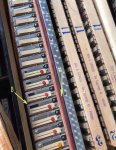Corinto pid=68502 dateline=1575892793 said:
Lautre jour, jécoute la radio en me réveillant
Cétait Yvette Horner qui jouait de laccordéon
Ton accordéon me fatigue Yvette
Si tu jouais plutôt de la clarinette
Oh, Yeah !
(Les élucubrations dAntoine)
Hi Corinto,
Guess that just about sums up the modern attitude to the accordion in France.
Jazz, manouche, and classical seem to be keeping it going in France, as well as a handful of musette tribute performers. Any video footage of such tribute performers inevitably features dancers who are older than I am, so those of us who remember the old days had better just enjoy it while we can.
debra pid=68505 dateline=1575896795 said:
After listening to some of the links provided what is most obvious to me is that the similarly looking accordions (French style) sound differently because of the tuning. The Walter Giannarelli video for instance uses an accordion with quite a lot of tremolo (16 cents is standard Italian tuning, this one may have even more) whereas real French musette accordions have little tremolo, like 8 cents. I realize that for many people musette sounds equal to lots of tremolo but the reality is that French musette is best played on a French accordion with very little tremolo, and this gives it that characteristic French sound.
Hi Paul,
Italian players were actively discouraged from playing musette type material by some of the old teachers, who opined that musette tuning created a sound that was hard on the ears and not very musical. Walter Giannarelli and others like him do tend to push the boundaries with musette tuning, and I think that Stocco is up above 16 cents, as you suspect.
To this day Im still unsure of the situation in Italy with regard to musette players like Walter Giannarelli, although the number of Italian players using musette tuning appears to exceed their French counterparts, at least in the north of Italy.
I for one was glad when most French players ditched their 20 cent instruments and replaced them with 8 cent models. However, it must be said that a small number of French players still use fairly strong musette tuning.
The sound I most associate with Italian popular accordion is this one:-
OK, as per usual, more of a display of virtuosity than music per se, but thats just the way the Italians do it.
Or, if you prefer you could listen to this:-
If that guy was playing that box in Milan Id make sure I was in Calabria until he had stopped playing. No way I could listen to that for longer than I could find the mute button. Hes probably a great player, just not my cup of tea. There is strong musette and thats up there with the strongest. XXXXXL musette!

